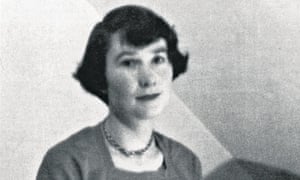 |
| 'How beautiful you were, and near, and young,' Larkin wrote of Winifred Dawson |
Winifred Dawson obituary
Ann Thwaite
Thu 28 Aug 2014 15.34 BST
First published on Thu 28 Aug 2014 15.34 BST
Winifred Dawson, who has died unexpectedly aged 85, after a stroke, was much loved and will always be remembered for one early relationship. As a young woman in Belfast in the 1950s, Winifred inspired five of Philip Larkin's poems – more than did any of the other women in his life. The "sweet girl-graduate" (in Lines on a Young Lady's Photograph Album) was also the subject of Latest Face and of Maiden Name (with "its five light sounds"), of He Hears That His Beloved Has Become Engaged and, written on the day of her wedding, Long Roots Moor Summer to Our Side of Earth.
"How beautiful you were," Larkin wrote, "and near, and young." His new biographer, James Booth, describes a "romantic friendship". Larkin would have liked it to be more, and reluctantly put away his "inconvenient emotions" and "dozens of happy memories which, like pressed flowers, I can spend all winter arranging". There are 26 letters to Win in the Selected Letters of Philip Larkin.
Winifred Arnott was born in London and read English at Queen's University Belfast. She lived with a "very dear aunt and uncle" at Lisburn and was working as a cataloguer in the university library when Larkin arrived in 1950 as sub-librarian. Many of the letters date from the time when she was in London, studying for her postgraduate diploma in librarianship. She returned to Belfast, but in 1954 left to marry Graham Bradshaw, who worked for the Ministry of Defence in London. There were three children but the marriage did not last, and in 1976 Win was on her own.
When my husband, Anthony, and I got to know her, through the Philip Larkin Society, Win was happily married to Grant Dawson, living in an impressive Arts and Crafts house in Winchester and at the heart of a large extended family. She had a wonderful gift for living life to the full and for friendship. It pleased her enormously to become a close friend of three of the other women in Larkin's life: Ruth Siverns (nee Bowman), his only fiancee, Jean Hartley, his early publisher, and Maeve Brennan, his beloved colleague.
Win travelled widely and often alone, most surprisingly, perhaps, to Greenland and the Galápagos Islands. She was an intrepid driver, prepared even in her 80s to drive regularly from Winchester to Hull. She rarely missed a Larkin Society event. One of our last memories of her was at King's Cross station in London in June, when the Larkin plaque, with the last lines of The Whitsun Weddings, was unveiled, and Win read one of the poems dear to her.
Proud as she was of her association with a great poet, Win was delighted to come into her own with the publication earlier this year of a biography, The Porter's Daughter, the life of Amy Audrey Locke, whose remarkable story she had stumbled upon when working as a librarian at St Swithun's school in Winchester. It was the product of many years of diligent research and remains as evidence of the skill and empathy of an unusual woman.
She is survived by Grant and her children, Nicholas, Lucy and Hilary.


No comments:
Post a Comment